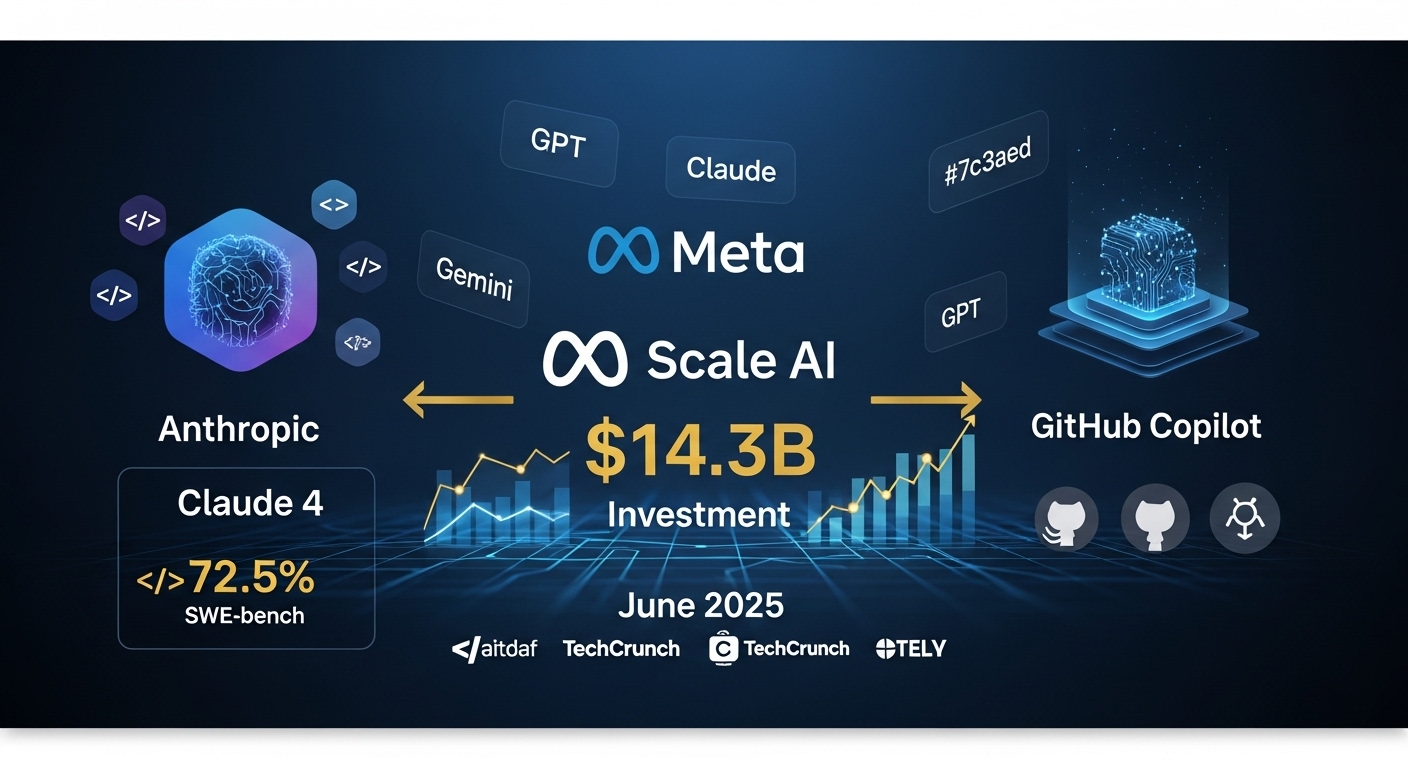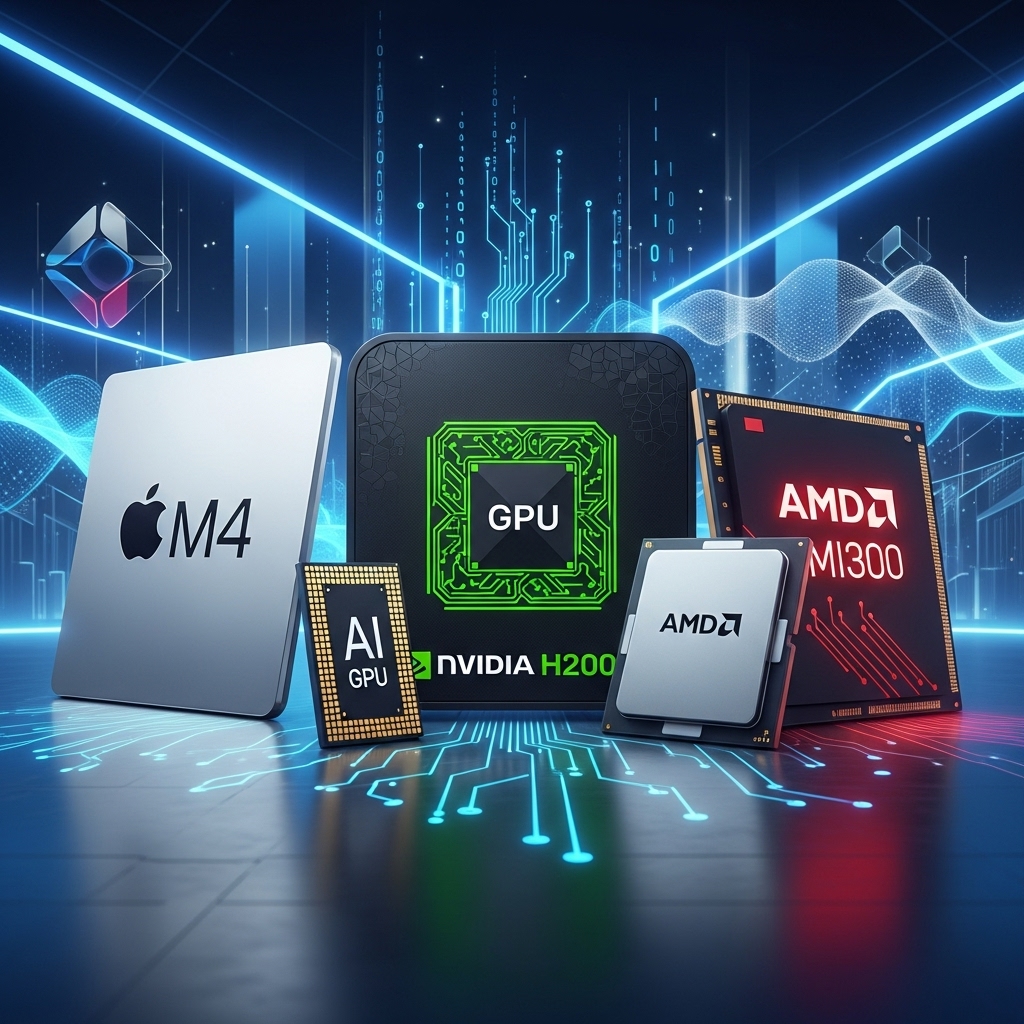AI News June 2025: Meta Invests $14.3 Billion in Scale AI, Claude 4 Dominates Coding
Meta's record $14.3 billion Scale AI deal, Anthropic's Claude 4 becomes world's best coding AI, GitHub Copilot revolutionizes development. Complete report on June 2025's most important AI developments.

Table of Contents
The week of June 15-22, 2025 marked a watershed moment for the artificial intelligence industry. Between record investments, technological breakthroughs, and strategic partnerships, this week redefined the global AI landscape with profound implications for businesses and developers.
Meta Invests $14.3 Billion in Scale AI: The Deal of the Decade
Meta announced the largest investment in AI history: $14.3 billion in Scale AI, bringing the company’s valuation to $29 billion. But this isn’t just a financial investment—it’s a total strategic partnership that’s reshaping the industry.
The deal includes Scale AI CEO Alexandr Wang joining Meta directly to lead the company’s AI efforts. This move represents industry consolidation under mega-partnerships and accelerates the development of enterprise-quality training datasets.
What does this mean for the market? We’re witnessing a new standard for enterprise AI valuations and a clear signal of B2B AI market maturity. Analysts predict this deal will push other tech giants to consolidate their AI partnerships in the coming months.
Anthropic’s Claude 4: The New Coding AI Champion
On May 22, 2025, Anthropic launched the Claude 4 family, positioning Claude Opus 4 as “the world’s best coding model” with 72.5% performance on SWE-bench, surpassing all existing competitors.
The most interesting innovations include Extended Thinking with Tool Use, allowing models to use tools like web search during the reasoning process. This means Claude 4 can now seamlessly combine text, code, and real-time search to tackle complex problems autonomously.
Claude Code is now generally available with native integrations for VS Code and JetBrains, offering automatic generation of code, tests, and pull requests. Developers who’ve tested it report an 88% productivity increase, with some CTOs stating that 90% of their code is now AI-generated.
The financial impact was immediate: Anthropic secured $3.5 billion in Series E, reaching a $61.5 billion valuation.
The AI Agents Revolution: 2025 Year of Change
Microsoft announced at Build 2025 one of the year’s most significant innovations: multi-agent orchestration capabilities in its Copilot Studio. The new Agent-to-Agent (A2A) protocol allows AI agents to delegate tasks to each other, managing multi-phase projects without human supervision.
Meanwhile, GitHub revolutionized software development with the Copilot coding agent, now available on iOS, Android, and CLI. Agents can be assigned to issues like human developers, automatically generating code, tests, and pull requests. This marks the shift from “pair programming” to “peer programming,” where AI acts as an equal rather than an assistant.
Unexpected Partnerships: OpenAI and Google Cloud Collaborate
One of the week’s most surprising news was OpenAI’s announcement of using Google Cloud for computational capacity. This unprecedented collaboration between AI rivals diversifies OpenAI’s dependence on Microsoft Azure, adding to existing partnerships with Oracle and CoreWeave.
Sam Altman also announced the delay of OpenAI’s first open-source model to “later this summer,” citing an “unexpected and quite surprising research breakthrough.” Analysts speculate this breakthrough could involve new model architectures or advanced reasoning capabilities.
AI Safety: First Government-Industry Partnerships
On June 19, 2025, the U.S. AI Safety Institute announced formal collaboration agreements with Anthropic and OpenAI. These represent the first partnerships of their kind between government and industry for AI safety, covering pre- and post-release model evaluation, safety research, and risk mitigation.
In Europe, the European Union continues AI Act implementation with €145.5 million allocated to strengthen European cybersecurity. Rules for general-purpose AI models will become effective in August 2025.
Concrete Results in Businesses
Practical applications are generating measurable ROI. Lumen Technologies reduced sales preparation time from 4 hours to 15 minutes using Microsoft Copilot, projecting $50 million in annual savings. Cisco reports a 10x productivity increase for platform engineering with AI agents.
Klarna achieved an 80% reduction in customer query resolution time, while Mercedes-Benz launched the MBUX virtual assistant with multimodal capabilities, reaching 95% customer satisfaction.
Adoption statistics confirm the trend: 32.4% of US companies now pay for OpenAI subscriptions (up from 18.9% in January 2025), while 42% of enterprise organizations actively use AI in business operations.
Evolution of Developer Tools
The AI-powered IDE market is exploding. Cursor became the fastest-growing SaaS to reach $100M ARR, with projections of $200M ARR by March 2025. The company attracted 2.8 million active developers with a 94% renewal rate.
OpenAI acquired Windsurf from Codeium for $850 million, gaining automatic context management capabilities at a competitive price of $15/month. GitHub continues evolving with Copilot Workspace, offering session-based workflows for issue-to-PR development.
Scientific Research Breakthrough
A revolutionary publication on arXiv by Nicole Hsing et al. introduced MIRROR: Cognitive Inner Monologue for LLMs. This innovation in cognitive AI architecture implements parallel reasoning capabilities through a dual-layer architecture, achieving an average 21% performance improvement on GPT-4o, Gemini 1.5 Pro, and Claude 3.7 Sonnet.
Trends for Second Half 2025
Four mega-trends will emerge in the second half of the year:
Multi-Agent Systems will become mainstream, with platforms enabling multiple AI agents to collaborate on complex projects. Local AI will gain traction for privacy and cost concerns, with powerful models running directly on enterprise devices.
Evaluation Tools will see high demand for AI system testing and evaluation, while Enterprise Context Management will address the “context problem” for business AI.
Growing Investments and Market
The AI market continues dominating venture investments, capturing 28% of all venture dollars in Q3 2025 ($19 billion), with 69% concentrated in $100M+ mega-rounds. Geographic distribution shows 45% in the US, 25% in China, 15% in Europe.
Implications for Global Businesses
For CTOs and CEOs, the week defined clear priorities. Tier 1 investments should include AI coding tools for immediate ROI, customer service AI for 60-80% cost reduction, and document processing for administrative workflow automation.
Strategic pilots should focus on multi-agent systems, custom AI training for specific businesses, and edge AI deployment for privacy-first future preparation.
Conclusions: AI Becomes Infrastructure
The week of June 15-22, 2025 demonstrated that AI is undergoing a fundamental transformation: from experimental technology to essential business infrastructure.
Market consolidation through mega-partnerships like Meta-Scale AI, measurable ROI from enterprise success cases (200-3000%), and technological maturity demonstrated by Claude 4 and GitHub Copilot indicate we’re entering a new AI phase.
The time to act is now. Companies implementing AI strategically today will have unrecoverable competitive advantages in the next 18-24 months. Evolution toward agentic systems, strategic safety partnerships, and cognitive architecture breakthroughs promise to radically transform how we work and innovate.
Ready to transform your business with next-generation AI? Start your free trial with 42ROWS and discover how to automate your data processes while the AI landscape evolves at record speed.
Tags
About the Author
42ROWS Team
The 42ROWS team continuously monitors AI developments to provide strategic insights for businesses implementing data automation solutions.
